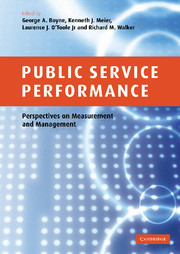Book contents
- Frontmatter
- Contents
- List of figures
- List of tables
- Notes on contributors
- 1 Introduction
- 2 Subjective and objective measures of organizational performance: An empirical exploration
- 3 All measures of performance are subjective: More evidence on US federal agencies
- 4 A qualitative evaluation of public sector organizations: Assessing organizational performance in healthcare
- 5 Quantitative approaches towards assessing organizational performance
- 6 Consequences of goal ambiguity in public organizations
- 7 Performance control and public organizations
- 8 Bureaucratic red tape and organizational performance: Testing the moderating role of culture and political support
- 9 All that glitters is not gold: Disaggregating networks and the impact on performance
- 10 Network evolution and performance under public contracting for mental health services
- 11 The design and management of performance-based contracts for public welfare services
- 12 Outsourcing government information technology services: An Australian case study
- 13 International comparisons of output and productivity in public service provision: A review
- 14 Public management and government performance: An international review
- 15 What drives global e-government? An exploratory assessment of existing e-government performance measures
- 16 Public management and organizational performance: An agenda for research
- Index
- References
5 - Quantitative approaches towards assessing organizational performance
Published online by Cambridge University Press: 22 September 2009
- Frontmatter
- Contents
- List of figures
- List of tables
- Notes on contributors
- 1 Introduction
- 2 Subjective and objective measures of organizational performance: An empirical exploration
- 3 All measures of performance are subjective: More evidence on US federal agencies
- 4 A qualitative evaluation of public sector organizations: Assessing organizational performance in healthcare
- 5 Quantitative approaches towards assessing organizational performance
- 6 Consequences of goal ambiguity in public organizations
- 7 Performance control and public organizations
- 8 Bureaucratic red tape and organizational performance: Testing the moderating role of culture and political support
- 9 All that glitters is not gold: Disaggregating networks and the impact on performance
- 10 Network evolution and performance under public contracting for mental health services
- 11 The design and management of performance-based contracts for public welfare services
- 12 Outsourcing government information technology services: An Australian case study
- 13 International comparisons of output and productivity in public service provision: A review
- 14 Public management and government performance: An international review
- 15 What drives global e-government? An exploratory assessment of existing e-government performance measures
- 16 Public management and organizational performance: An agenda for research
- Index
- References
Summary
Introduction
One of the major challenges confronting any commentary on public service performance is how to secure meaningful quantitative measures of performance. This difficulty should not be surprising. The impossibility of fully measuring the output of public services is one of the fundamental reasons why their provision cannot be left entirely to competitive markets, and why some sort of public sector regulation is required.
Nevertheless, over the last 25 years a growing capacity to measure aspects of public service performance has emerged, through what might be termed the ‘performance indicator movement’ (Bird et al. 2005). A confluence of forces has led to this revolution in the collection and use of public service performance data. On the supply side, the massive advances in information technology have greatly reduced the price of collecting and processing data. On the demand side there has emerged a growing popular and political scepticism of public service professionals and institutions, and calls for greater independent audit and accountability. Performance data appear to answer many of these concerns.
In the United Kingdom, the emergence of the performance indicator culture can be traced to 1981, when the national government mandated the collection of a suite of Local Government Comparative Statistics in England and Wales, and required local governments to publish in an annual report comparisons of their own performance with that of ‘similar’ institutions (Smith 1990; Carter et al. 1992).
Information
- Type
- Chapter
- Information
- Public Service PerformancePerspectives on Measurement and Management, pp. 75 - 91Publisher: Cambridge University PressPrint publication year: 2006
References
Accessibility standard: Unknown
Why this information is here
This section outlines the accessibility features of this content - including support for screen readers, full keyboard navigation and high-contrast display options. This may not be relevant for you.Accessibility Information
- 5
- Cited by
